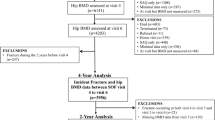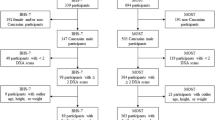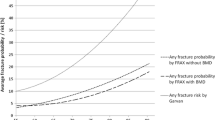Abstract
Introduction
Hip fracture is a major public health problem, annually affecting over 350,000 persons in the United States and 1.6 million worldwide. Consequences include decreased survival, loss of independence, and increased risk of subsequent fractures. A substantial decline in bone mineral density (BMD) also occurs, yet the magnitude of the decline specifically attributable to hip fracture has not been documented.
Methods
To determine the amount of BMD decline attributable to hip fracture, the rate of decline in BMD in a cohort of hip fracture patients was compared with that in a cohort of women of similar age and BMD but without hip fracture. All subjects were community dwelling when enrolled. Hip fracture patients in the Baltimore Hip Studies (BHS) came from two hospitals in Baltimore, Maryland, from 1992 through 1995; comparison subjects came from the Study of Osteoporotic Fracture (SOF) enrolled in four areas of the United States during the same period. Eighty-four white, female hip fracture patients 65 years and older from the BHS were compared with 168 SOF participants matched on age, race, and BMD at baseline. BMD of the femoral neck and total hip was measured by dual-energy x-ray absorptiometry.
Results
Hip fracture patients had a greater decline in BMD during the 12-month postfracture follow-up than that expected on the basis of the nonfracture cohort: 4.9% vs. 0.4% at the femoral neck and 3.5% vs. 0.7% for the total hip. The decline in BMD in hip fracture patients was 11.8 times the amount expected at the femoral neck (matched on age and baseline BMD and adjusted for between-cohort differences in smoking prevalence) and 4.9 times that expected for the total hip at the end of 1 year after the hip fracture.
Conclusion
In this sample of older women, bone loss over the year following hip fracture far exceeded that expected and is an important clinical management concern.

Similar content being viewed by others
References
Cooper C, Campion G, Melton LJ (1992) Hip fractures in the elderly: a world-wide projection. Osteoporos Int 2:285–289
Gullberg B, Johnell O, Kanis JA (1997) World-wide projections for hip fracture. Osteoporos Int 7:407–413
Magaziner J, Hawkes W, Hebel JR, Zimmerman SI, Fox KM, Dolan M et al (2000) Recovery from hip fracture in eight areas of function. J Gerontol A Biol Sci Med Sci 55A:M498–M507
Magaziner J, Lydick E, Hawkes W, Fox KM, Zimmerman SI, Epstein RS et al (1997) Excess mortality attributable to hip fracture in white women aged 70 years and older. Am J Public Health 87:1630–1636
Magaziner J, Fredman L, Hawkes W, Hebel JR, Zimmerman S, Orwig DL et al (2003) Changes in functional status attributable to hip fracture: a comparison of hip fracture patients to community-dwelling aged. Am J Epidemiol 157:1023–1031
Wehren LE, Magaziner J (2003) Hip fracture: risk factors and outcomes. Curr Osteoporos Rep 1:78–85
van Balen R, Steyerberg EW, Polder JJ, Ribbers TLM, Habbema JDF, Cools HJM (2001) Hip fracture in elderly patients: outcomes for function, quality of life, and type of residence. Clin Ortop 390:232–243
Braithwaite RS, Col NF, Wong JB (2003) Estimating hip fracture morbidity, mortality and costs. J Am Geriatr Soc 51:364–370
Ray NF, Chan JK, Thamer M, Melton LJ (1997) Medical expenditures for the treatment of osteoporotic fractures in the United States in 1995: report from the National Osteoporosis Foundation. J Bone Miner Res 12:24–35
Brainsky A, Glick H, Lydick E, Epstein R, Fox KM, Hawkes W et al (1997) The economic cost of hip fractures in community-dwelling older adults: a prospective study. J Am Geriatr Soc 45:281–287
Kashner T, Magaziner J, Pruitt S (1990) Family size and caregiving of aged parents with hip fractures. In: Biegel D, Blum A (eds) Aging and caregiving: theory, research and policy. Sage Publications, Beverly Hills, CA, pp 184–203
Saltz CC, Zimmerman SI, Tompkins C, Harrington D, Magaziner J (1999) Stress among caregivers of hip fracture patients: a longitudinal study. J Gerontol Soc Work 30:167–181
Melton LJ 3rd, Gabriel SE, Crowson CS, Tosteson AN, Johnell O, Kanis JA (2003) Cost-equivalence of different osteoporotic fractures. Osteoporos Int 14(5):383–388
Melton LJI (1993) Hip fractures: a worldwide problem today and tomorrow. Bone 14:S1–S8
Jones G, Nguyen T, Sambrook P, Kelly PJ, Eisman JA (1994) Progressive loss of bone in the femoral neck in elderly people: longitudinal findings from the Dubbo Osteoporosis Epidemiology Study. Br Med J 309:691–695
Ensrud KE, Palermo L, Black DM, Cauley J, Jergas M, Orwoll ES et al (1995) Hip and calcaneal bone loss increase with advancing age: longitudinal results from the Study of Osteoporotic Fractures. J Bone Miner Res 10(11):1778–1787
Burger H, de Laet CEDH, van Daele PLA, Weel AEAM, Witteman JCM, Hofman A et al (1998) Risk factors for increased bone loss in an elderly population: the Rotterdam Study. Am J Epidemiol 147(9):871–879
Dennison E, Eastell R, Fall CHD, Kellingray S, Wood PJ, Cooper C (1999) Determinants of bone loss in elderly men and women: a prospective population-based study. Osteoporos Int 10:384–391
Karlsson MK, Obrant KJ, Nilsson BE, Johnell O (2000) Changes in bone mineral, lean body mass and fat content as measured by dual energy X-ray absorptiometry: a longitudinal study. Calcif Tissue Int 66:97–99
Melton LJ III, Atkinson EJ, O’Connor MK, O’Fallon WM, Riggs BL (2000) Determinants of bone loss from the femoral neck in women of different ages. J Bone Miner Res 15(1):24–31
Karlsson M, Nilsson JA, Sernbo I, Redlund-Johnell I, Johnell O, Obrant KJ (1996) Changes of bone mineral mass and soft tissue composition after hip fracture. Bone 18(1):19–22
Dirschl DR, Henderson RC, Oakley WC (1997) Accelerated bone mineral loss following a hip fracture: a prospective longitudinal study. Bone 21(2):79–82
Fox KM, Magaziner J, Hawkes WG, Yu-Yahiro J, Hebel JR, Zimmerman SI et al (2000) Loss of bone density and lean body mass after hip fracture. Osteoporos Int 11(1):31–35
Colón-Emeric C, Kuchibhatla M, Pieper C, Hawkes W, Fredman L, Magaziner J et al (2003) The contribution of hip fracture to risk of secondary fractures: data from two longitudinal studies. Osteoporos Int 14(11):879–883
Schroder HM, Petersen KK, Erlandsen M (1993) Occurrence and incidence of the second hip fracture. Clin Ortop 289:166–169
Chapurlat RD, Bauer DC, Nevitt M, Stone K, Cummings SR (2003) Incidence and risk factors for a second hip fracture in elderly women. The Study of Osteoporotic Fractures. Osteoporos Int 14(2):130–136
Cummings SR, Nevitt MC, Browner WS, Stone K, Fox KM, Ensrud KE et al (1995) Risk factors for hip fracture in white women. Study of Osteoporotic Fractures Research Group. N Engl J Med 332(12):767–773
Cummings SR, Black DM, Nevitt MC, Browner WS, Cauley JA, Genant HK et al (1990) Appendicular bone density and age predict hip fracture in women. JAMA 263:665–668
Steiger P, Cummings SR, Black DM, Spencer NE, Genant HK (1992) Age-related decrements in bone mineral density in women over 65. J Bone Miner Res 7(6):625–632
Fredman L, Hawkes W, Zimmerman SI, Hebel JR, Magaziner J (2001) Extending gerontological research through linking investigator’s studies to public-use datasets. Gerontologist 41(1):15–22
Wolinsky FD, Fitzgerald JF, Stump TE (1997) The effect of hip fracture on mortality, hospitalization, and functional status: a prospective study. Am J Public Health 87(3):398–403
Fredman L, Magaziner J, Hawkes W, Hebel JR, Fried LP, Kasper J et al (2005) Female hip fracture patients had poorer performance-based functioning than community-dwelling peers over 2-year follow-up period. J Clin Epidemiol 58(12):1289–1298
Sherrington C, Lord SR (1998) Increased prevalence of fall risk factors in older people following hip fracture. Gerontology 44:340–344
Nevitt MC, Cummings SR, Hudes ES (1991) Risk factors for injurious falls: a prospective study. J Gerontol 46(5):M164–M170
Tromp AM, Smit JH, Deeg DJH, Bouter LM, Lips P (1998) Predictors for falls and fractures in the Longitudinal Aging Study Amsterdam. J Bone Miner Res 13(12):1932–1939
King MB, Tinetti ME (1995) Falls in community-dwelling older persons. J Am Geriatr Soc 43:1146–1154
Dretakis KE, Dretakis EK, Papakitsou EF, Psarakis S, Steriopoulos K (1998) Possible predisposing factors for the second hip fracture. Calcif Tissue Int 62:366–369
Jorgensen L, Jacobsen BK (2001) Changes in muscle mass, fat mass, and bone mineral content in the legs after stroke: a 1 year prospective study. Bone 28:655–659
Uebelhart D, Bernard J, Hartmann DJ, Moro L, Roth M, Uebelhart B et al (2000) Modifications of bone and connective tissue after orthostatic bedrest. Osteoporos Int 11(1):59–67
LeBlanc A, Schneider V, Shackelford L, West S, Oganov V, Bakulin A et al (2000) Bone mineral and lean tissue loss after long duration space flight. J Musculoskel Neuron Interact 1:157–160
LeBlanc AD, Schneider VS, Evans HJ, Engelbretson DA, Krebs JM (1990) Bone mineral loss and recovery after 17 weeks of bed rest. J Bone Miner Res 5:843–850
Jorgensen L, Jacobsen BK, Wisgaard T, Magnus JH (2000) Walking after stroke: does it matter? Changes in bone mineral density within the first 12 months after stroke. A longitudinal study. Osteoporos Int 11:381–387
LeBoff MS, Kohlmeier L, Hurwitz S, Franklin J, Wright J, Glowacki J (1999) Occult vitamin D deficiency in postmenopausal US women with acute hip fracture. JAMA 281(16):1501–1511
Yu-Yahiro JA, Michael RH, Dubin NH, Fox KM, Sachs M, Hawkes W et al (2001) Serum and urine markers of bone metabolism during the year after hip fracture. J Am Geriatr Soc 49:877–883
Dubin NH, Monahan LK, Yu-Yahiro JA, Michael RH, Zimmerman SI, Hawkes W et al (1999) Serum concentrations of steroids, parathyroid hormone, and calcitonin in postmenopausal women during the year after hip fracture: effect of location of fracture and age. J Gerontol: Med Sci 54A(9):M467–M473
Garnero P, Hausherr E, Chapuy M-C, Marcelli C, Grandjean H, Muller C et al (1996) Markers of bone resorption predict hip fracture in elderly women: the EPIDOS prospective study. J Bone Miner Res 11(10):1531–1538
Akesson K, Vergnaud P, Gineyts E, Delmas PD, Obrant KJ (1993) Impairment of bone turnover in elderly women with hip fracture. Calcif Tissue Int 53:162–169
Wehren LE, Hawkes W, Hebel JR, Orwig D, Zimmerman SI, Fox KM et al (2004) Predictors of bone loss after hip fracture. Osteoporos Int 15:125–131
National Osteoporosis Foundation (2003) Physician’s guide to prevention and treatment of osteoporosis. National Osteoporosis Foundation, Washington, DC
National Osteoporosis Foundation (2003) Health professional’s guide to rehabilitation of the patient with osteoporosis. National Osteoporosis Foundation, Washington, DC
Orwig DL, Wehren LE, Yu-Yahiro JA, Hochberg M, Magaziner J (2001) Treatment of osteoporosis following a hip fracture: sending results of bone densitometry to primary care physicians does not increase use of pharmacologic therapy (Abstract F382). J Bone Miner Res 16(Suppl 1):S220
Juby AG, De Geus-Wenceslau CM (2002) Evaluation of osteoporosis treatment in seniors after hip fracture. Osteoporos Int 13:205–210
Solomon DH, Finkelstein JS, Katz JN, Mogun H, Avorn J (2003) Underuse of osteoporosis medications in elderly patients with fractures. Am J Med 115:398–400
Simonelli C, Chen Y-T, Morancey J, Lewis AF, Abbott TAI (2003) Evaluation and management of osteoporosis following hospitalization for low-impact fracture. J Gen Intern Med 18:17–22
Kamel HK, Duthie EH (2002) The underuse of therapy in the secondary prevention of hip fractures. Drugs Aging 19:1–10
Harrington JT, Broy SB, Derosa AM, Licata AA, Shewmon DA (2002) Hip fracture patients are not treated for osteoporosis: a call to action. Arthritis Rheum 47:651–654
Gardner MJ, Flik K, Mooar PA, Lane JM (2002) Improvement in the undertreatment of osteoporosis following hip fracture. J Bone Joint Surg 84-A:1342–1348
Follin S, Black J, McDermott M (2003) Lack of diagnosis and treatment of osteoporosis in men and women after hip fracture. Pharmacotherapy 23:190–198
Bahl S, Coates PS, Greenspan SL (2003) The management of osteoporosis following hip fracture: have we improved our care? Osteoporos Int 14(11):884–888
Jachna CM, Whittle J, Lukert B, Graves L, Bhargava T (2003) Effect of hospitalist consultation on treatment of osteoporosis in hip fracture patients. Osteoporos Int 14(8):665–671
Black JN, Follin SL (2001) Osteoporosis diagnosis and management following hip fracture [abstract]. J Bone Miner Res 16(Suppl 1):S214
Cree MW, Juby AG, Carriere KC (2003) Mortality and morbidity associated with osteoporosis drug treatment following hip fracture. Osteoporos Int 14(9):722–727
Bellantonio S, Fortinsky RH, Prestwood K (2001) How well are community-living women treated for osteoporosis after hip fractures? J Am Geriatr Soc 49:1197–1204
Kaufman JD, Bolander ME, Bunta AD, Edwards BJ, Fitzpatrick LA, Simonelli C (2003) Barriers and solutions to osteoporosis care in patients with a hip fracture. J Bone Joint Surg Am 85-A(9):1837–1843
Taylor JC, Sterkel B, Utley M, Shipley M, Newman S, Horton M et al (2001) Opinions and experiences in general practice on osteoporosis prevention, diagnosis, and management. Osteoporos Int 12:844–848
Simonelli C, Killeen K, Mehle S, Swanson L (2002) Barriers to osteoporosis identification and treatment among primary care physicians and orthopedic surgeons. Mayo Clinic Proc 77:334–338
Morris AH, Zuckerman JD (2002) National Consensus Conference on Improving the Continuum of Care for Patients with Hip Fracture. J Bone Joint Surg Am 84-A(4):670–674
Chilov MN, Cameron ID, March LM (2003) Evidence-based guidelines for fixing broken hips: an update. Med J Aust 179(9):489–493
Freitag MH, Magaziner J (2006) Post-operative considerations in hip fracture management. Curr Rheumatol Rep 8(1):55–62
Acknowledgements
We would like to acknowledge the Baltimore Hip Studies, funded through Public Health Service Grant R37AG09901; the Study of Osteoporotic Fractures, funded through Public Health Service Grants AG05395, AG05407, AR35582, AR35583, and AR35584; and the Claude D. Pepper Older Americans Independence Center, grant P60-AG12583.
Author information
Authors and Affiliations
Corresponding author
Rights and permissions
About this article
Cite this article
Magaziner, J., Wehren, L., Hawkes, W.G. et al. Women with hip fracture have a greater rate of decline in bone mineral density than expected: another significant consequence of a common geriatric problem. Osteoporos Int 17, 971–977 (2006). https://doi.org/10.1007/s00198-006-0092-3
Received:
Accepted:
Published:
Issue Date:
DOI: https://doi.org/10.1007/s00198-006-0092-3




